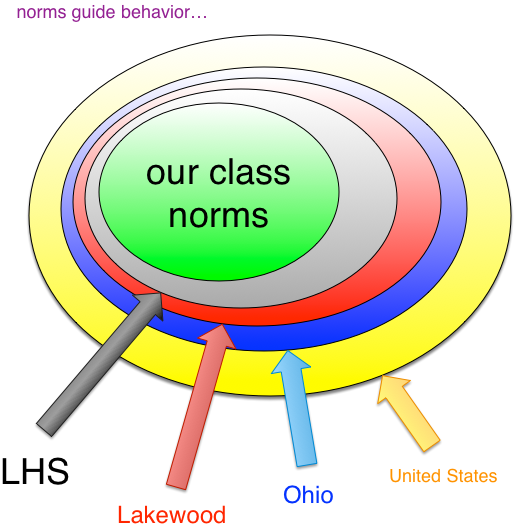Rules
The rules in our classroom are pretty simple, but we live in a world of rules, so students are expected to behave in accordance with all of the applicable Federal, State, and City laws, and the codes of conduct found in the Lakewood High School 2017-2018 Course Guide. and the Student & Parent Handbook. Disciplinary procedures and consequences can be found there as well. Our class rules include all of these.

Our Rules:
All our class rules, procedures, and practices, conform to two fundamental guiding axioms or postulates, which I hope everyone will read and understand. They are:
- Be nice.
- Work hard.
Our rules, and nearly every other important rule we follow, end up being either something that really is just good manners or something that is devised to help you learn.
No one can force you to learn if you don't want to; but preventing others from learning is a very serious offense in our classroom.
A few specifics follow.
Particular Rules, so far
- Every student should arrive in class every day with the following standard equipment:
- a pencil or two, with an eraser
- several sheets of paper
- your calculator
- a binder to organize your notes, assignments, returned tests, etc.
- our textbook (APstats & CM only)
- Class begins when the starting bell rings. At that time conversations should quickly wrap up and students should immediately pay attention or begin working if there is bellwork or warmup work on the board.
- Work should be given to Mr. Petto before the starting bell rings.
Mr. Petto’s Pet Peeves
- electronics (keep then invisible, unless you receive an OK)
- IDs (they need to be worn at all times)
- food & drink (no!)
- throwing or “tossing” things
- touching Mr. Petto’s stuff, or anything that isn't yours
Changing the Rules
Any of the class rules, practices, or norms can be changed. The procedure for initiating change follows:
- Suggestions for change are to be submitted to Mr. Petto in writing. Requests should include supportive and persuasive justification.
- Anyone suggesting or supporting a proposed change should be prepared to attend a general discussion of the matter, usually scheduled at a mutually convenient time before or after school.